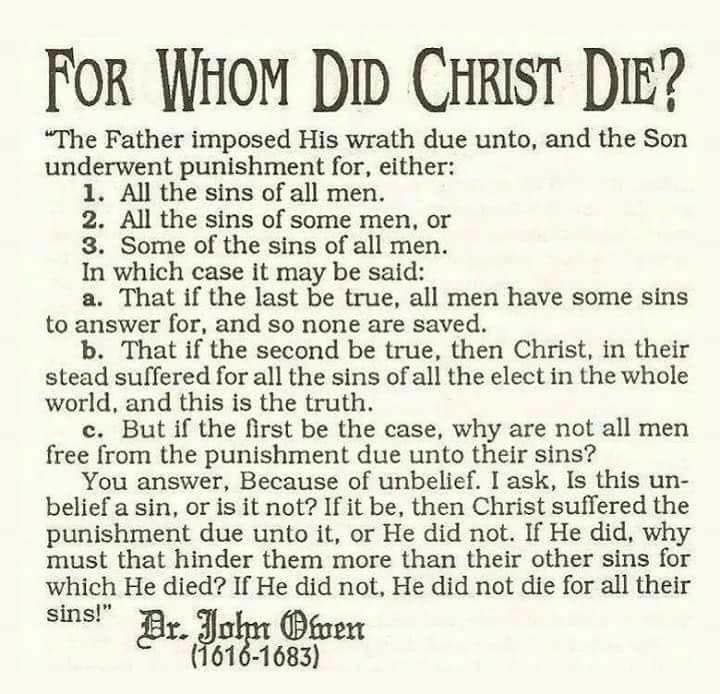
Matt wrote:
It assumes universal atonement necessitates universalism, which it doesn’t. If you are a Calvinist, then you affirm you were, at some point, both under God’s wrath and (simultaneously) atoned for by Christ as His elect. You didn’t receive redemption through Christ’s sacrifice until faith was imparted to you by the Spirit. In the same way, those who will never be given faith by the Spirit are still atoned for; they simply cannot benefit from the atonement without Spirit-given faith.
Thank you for commenting, Matt. I'll try and answer your objections as best as I can. Hopefully, we can have a fruitful discussion.
It assumes universal atonement necessitates universalism, which it doesn’t. <
I believe it does. I'm going to demonstrate the logical conclusion of Calvinism you presented is actually in error. While you got a few points right, the final outcome isn't how it's understood.
If you are a Calvinist, then you affirm you were, at some point, both under God’s wrath and (simultaneously) atoned for by Christ as His elect. <
This is true. In Ephesians 2:3, Paul wrote,
among whom we all once lived in the passions of our flesh, carrying out the desires of the body and the mind, and were by nature children of wrath, like the rest of mankind.
He also makes a similar statement in Colossians 3. The elect were formerly under the wrath of God.
You didn’t receive redemption through Christ’s sacrifice until faith was imparted to you by the Spirit. <
This is where I have to stop you. We experience God's decree as it unfolds in time. However, God's decree has already been declared in eternity past. God's election has already been made. To say "you didn't receive redemption" implies there is a possibility God's elect won't be saved, won't be redeemed. This is false.
The Bible says we were "predestined". Our election has already occurred. Our salvation and redemption already secured. Our experience in time is the unfolding of what has already been decided.
For example, Revelation 13:8,
everyone whose name has not been written before the foundation of the world in the book of life of the Lamb who was slain
God's elect were written in the book of life before the world was created, before sin entered the world, before Jesus even died. My name, your name, every Saints' name was in the book on the first day of Creation before Adam was even created.
And this isn't a lone passage. Paul has more to say in Ephesians 1:3-10,
Blessed be the God and Father of our Lord Jesus Christ, who has blessed us in Christ with every spiritual blessing in the heavenly places, 4 even as he chose us in him before the foundation of the world, that we should be holy and blameless before him. In love 5 he predestined us for adoption to himself as sons through Jesus Christ, according to the purpose of his will, 6 to the praise of his glorious grace, with which he has blessed us in the Beloved. 7 In him we have redemption through his blood, the forgiveness of our trespasses, according to the riches of his grace, 8 which he lavished upon us, in all wisdom and insight 9 making known to us the mystery of his will, according to his purpose, which he set forth in Christ 10 as a plan for the fullness of time, to unite all things in him, things in heaven and things on earth..
TL;DR
God's decree is not bound to time. We, as creatures bound to time, are seeing it unfold in time. We are predestined to be redeemed in eternity past. There is no doubt of our redemption and are a process of something God began in eternity past. The two views are incomparable.
In the same way, those who will never be given faith by the Spirit are still atoned for; they simply cannot benefit from the atonement without Spirit-given faith. <
Atonement and propitiation mean the sins have been paid for and the wrath of God has been appeased.
If God's wrath has been appeased and their sins have been paid for... what reason are they denied the atonement? For a lack of faith? Are you saying the atonement was insufficient in covering all sins but one?
Further confounding this position, Hebrews 7:25 indicates Jesus Christ "always lives to make intercession for them". Them being those whom He has atoned for (see verse 27). Is Jesus interceding for those whom He is going to send to Hell? If then, what use is Christ's intercession? And doesn't that make verse 25 a liar when it says, "he is able to save to the uttermost"?